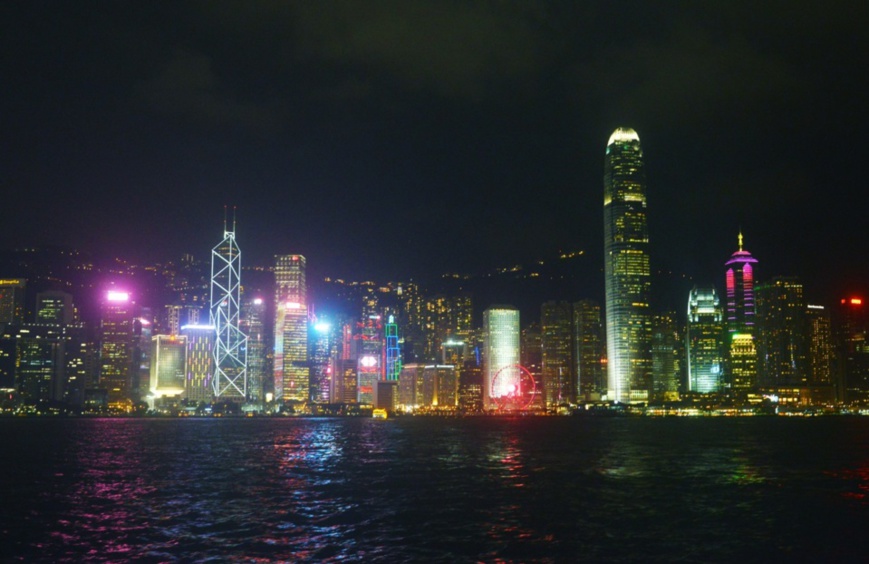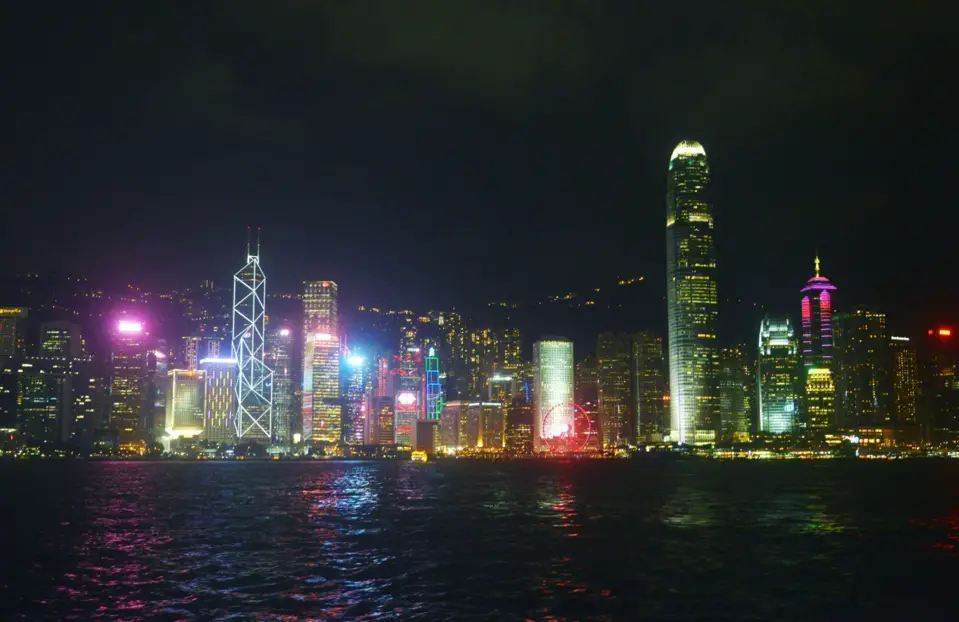By Chen Ran, People’s Daily

A night view of Victoria Harbour in China’s Hong Kong Special Administrative Region. Photo by Zheng Jinqiang/People’s Daily Online
A petition activity was launched in Hong Kong on May 24 in support of the national security legislation for the special administrative region (SAR), collecting nearly 100,000 signatures in a single day.
The activity was launched by a united front jointly established by leaders from Hong Kong’s social organizations, business world, education industry and social welfare sector.
Many Hong Kong citizens voiced support for the activity on social media platforms, hoping the national security legislation to bring pack tranquility to Hong Kong Special Administrative Region (HKSAR). Some said it is perfectly justified to safeguard national security, which is also a common responsibility of the Hong Kong society.
The united front has 13 conveners and more than 2,000 initiators, and has won support from over 700 social organizations.
The signature campaign is expected to last eight days, collecting signatures of Hong Kong citizens on the internet and in the streets to support the national security legislation for Hong Kong.
Citizens across Hong Kong’s 18 districts flocked to street booths and the designated website of the campaign to express support for protecting the SAR through legal means. They said the national security legislation lit their hopes, and the legislation would make the ‘Pearl of the Orient’ shine again.
Establishing and improving the legal system and enforcement mechanisms for the HKSAR to safeguard national security from the state level can effectively close the legal loopholes in Hong Kong’s efforts to safeguard national security, and lay a solid foundation for the SAR’s social harmony, stability, and long-term peace and order, said Starry Lee Wai-king, one of the conveners of the united front and chairwoman of the Democratic Alliance for the Betterment and Progress of Hong Kong (DAB).
“Hong Kong has been in chaos for too long, and citizens have tolerated too much,” said a Hong Kong citizen surnamed Wang, who came to sign her name in support of the legislation at a street booth in Yau Tong of Hong Kong’s Kowloon district.
“The misdeeds of violent rioters can by no means represent the ideas of all the citizens in Hong Kong, so I must come to sign my name here to support our country in protecting Hong Kong through legal means,” Wang said.
In the past few days, major alliances in Hong Kong, including the DAB, the Hong Kong Federation of Trade Unions (HKFTU), and Business and Professionals Alliance for Hong Kong (BPA), have all issued statements to support the 13th National People’s Congress (NPC) in deliberating at its third annual session on the draft decision of the NPC on establishing and improving the legal system and enforcement mechanisms for the HKSAR to safeguard national security.
As a result of the “black-clad violence,” mobsters’ “mutual destruction”, and the novel coronavirus disease (COVID-19), Hong Kong’s regional GDP logged the worst performance on record in the first quarter of 2020, slumping by 8.9 percent, while the SAR’s seasonally adjusted unemployment rate rose to the highest level in more than nine years, pointed out the BPA in a recent statement.
Therefore, efforts to introduce national security legislation for Hong Kong would be helpful not only in safeguarding national security, but also in maintaining prosperity and stability of Hong Kong and better guaranteeing the legal interests and freedom of Hong Kong citizens, said the statement.
Paul Chan Mo-po, financial secretary of the government of the HKSAR, voiced support on May 24 for the NPC’s deliberating on the draft decision.
With social unrest on the surface and other disturbing factors underneath, not only people’s livelihood and safety could be endangered, but the confidence of foreign investors will be shattered eventually, Chan wrote in his blog.
Some foreign chambers of commerce have expressed their concerns about the legislation and pointed out the importance for Hong Kong to uphold its established advantages, including free flow of information, freedom of speech, and a Government of high transparency and integrity, Chen wrote, adding that in fact, HKSAR Government has been working hard to protect and strengthen these values.
The central government has also emphasized that it will continue to protect the legitimate interests of foreign countries and investors in accordance with the law, support the maintenance and development of relations between Hong Kong and other countries in areas like economic and trade, culture and tourism, and support Hong Kong’s external exchanges and cooperation, Chan said. As normal investment, commercial and trade activities conducted by other countries in Hong Kong would not threaten the national security, such activities could be continued as usual.
The activity was launched by a united front jointly established by leaders from Hong Kong’s social organizations, business world, education industry and social welfare sector.
Many Hong Kong citizens voiced support for the activity on social media platforms, hoping the national security legislation to bring pack tranquility to Hong Kong Special Administrative Region (HKSAR). Some said it is perfectly justified to safeguard national security, which is also a common responsibility of the Hong Kong society.
The united front has 13 conveners and more than 2,000 initiators, and has won support from over 700 social organizations.
The signature campaign is expected to last eight days, collecting signatures of Hong Kong citizens on the internet and in the streets to support the national security legislation for Hong Kong.
Citizens across Hong Kong’s 18 districts flocked to street booths and the designated website of the campaign to express support for protecting the SAR through legal means. They said the national security legislation lit their hopes, and the legislation would make the ‘Pearl of the Orient’ shine again.
Establishing and improving the legal system and enforcement mechanisms for the HKSAR to safeguard national security from the state level can effectively close the legal loopholes in Hong Kong’s efforts to safeguard national security, and lay a solid foundation for the SAR’s social harmony, stability, and long-term peace and order, said Starry Lee Wai-king, one of the conveners of the united front and chairwoman of the Democratic Alliance for the Betterment and Progress of Hong Kong (DAB).
“Hong Kong has been in chaos for too long, and citizens have tolerated too much,” said a Hong Kong citizen surnamed Wang, who came to sign her name in support of the legislation at a street booth in Yau Tong of Hong Kong’s Kowloon district.
“The misdeeds of violent rioters can by no means represent the ideas of all the citizens in Hong Kong, so I must come to sign my name here to support our country in protecting Hong Kong through legal means,” Wang said.
In the past few days, major alliances in Hong Kong, including the DAB, the Hong Kong Federation of Trade Unions (HKFTU), and Business and Professionals Alliance for Hong Kong (BPA), have all issued statements to support the 13th National People’s Congress (NPC) in deliberating at its third annual session on the draft decision of the NPC on establishing and improving the legal system and enforcement mechanisms for the HKSAR to safeguard national security.
As a result of the “black-clad violence,” mobsters’ “mutual destruction”, and the novel coronavirus disease (COVID-19), Hong Kong’s regional GDP logged the worst performance on record in the first quarter of 2020, slumping by 8.9 percent, while the SAR’s seasonally adjusted unemployment rate rose to the highest level in more than nine years, pointed out the BPA in a recent statement.
Therefore, efforts to introduce national security legislation for Hong Kong would be helpful not only in safeguarding national security, but also in maintaining prosperity and stability of Hong Kong and better guaranteeing the legal interests and freedom of Hong Kong citizens, said the statement.
Paul Chan Mo-po, financial secretary of the government of the HKSAR, voiced support on May 24 for the NPC’s deliberating on the draft decision.
With social unrest on the surface and other disturbing factors underneath, not only people’s livelihood and safety could be endangered, but the confidence of foreign investors will be shattered eventually, Chan wrote in his blog.
Some foreign chambers of commerce have expressed their concerns about the legislation and pointed out the importance for Hong Kong to uphold its established advantages, including free flow of information, freedom of speech, and a Government of high transparency and integrity, Chen wrote, adding that in fact, HKSAR Government has been working hard to protect and strengthen these values.
The central government has also emphasized that it will continue to protect the legitimate interests of foreign countries and investors in accordance with the law, support the maintenance and development of relations between Hong Kong and other countries in areas like economic and trade, culture and tourism, and support Hong Kong’s external exchanges and cooperation, Chan said. As normal investment, commercial and trade activities conducted by other countries in Hong Kong would not threaten the national security, such activities could be continued as usual.
 Menu
Menu
 Nearly 100,000 HK citizens sign petition to support national security legislation for Hong Kong
Nearly 100,000 HK citizens sign petition to support national security legislation for Hong Kong
















